八年级英语下册 Module 1 Hobbies Unit 3 Language in use课件 外研版
【句子】八年级英语下册Module1Hobbies教案人教新目标版

【关键字】句子Module 1 Hobbies1、重点:(1) 通过谈论兴趣与爱好训练学生的听、说、读、写能力,掌握使用简单句表达兴趣爱好以及对兴趣爱好的简单评析。
(2) 了解句子的基本成分(主语,谓语,直接宾语与间接宾语,宾语补足语,表语,状语)。
2、难点:(1) 句子成分的辨析(主语,谓语,直接宾语与间接宾语,宾语补足语,表语,状语)(2) 英语简单句的五种基本句型和There be句型。
Unit 1 Do you collect anything?Step 1. Revision1. Revise some words about hobbies, such as , stamps, tickets, fans, stones, bags, ect.Step 2. Listen and complete the chart1. Look at the chart with the Ss, make sure they can know all the pictures how to express in English.2. Play the tape twice, the Ss listen and fill in the chart.3. Play the tape again, and check the answers with the Ss.4. Play the tape again, then answer the questions of the Part the book.1.Step 3. Listen and read2.Ask the Ss to read the dialogue in a few minutes.3.Translate it into Chinese with the Ss, and point to some main points.4.Read the dialogue and the Ss read after the teacher.5.The Ss read the dialogue after the tape.6.The Ss read the dialogue together.7. Read the dialogue again, then fill in the chart in the part the book.Step 4. Complete the sentences1.Ask the Ss to complete the sentences2. Check the answers with the SsStep 5 Work in pairs.Ask and answer about hobbies.1.Step 6 Look at the sentences and listen2.Play the tape, the Ss listen3.Play the tape again, the Ss read after the tape4.The Ss read the sentences together.Unit 2 Hobbies can make you grow as a personStep 1 Revision1.Read the words of Module 12.Dictate ten words of Module 13.Say something about hobby.Step 2. Presentation1.Look at the photos and say which hobbies you can see.2.Work in pairs. Choose a word in the box to describe the hobbies.Step 3. Read the passage and answer the question.1.Ask the Ss read the passage by themselves in a few minutes.2.Translate it into Chinese with the Ss, and point to some main points.3.Read the dialogue and the Ss read after the teacher.4.The Ss read the dialogue after the tape.5.The Ss read the dialogue together.6.Answer the questions about the passage.Step 4 Ask and answer1.Ask and answer the questions about the part 4and 52.Correct some mistakes.Step 5 Writing1. Use “as well as , such as, as a result” to change the sentences of part 6.2. Use “as well as , such as, as a result” to make some sentences.3.Write a short passage called My classmate’s hobby. Use “as well as , suchas, as a result”.Unit 3 Language in useStep 1. Language practice1.Read the sentences together.2.Express the sentences and five basic patterns.Step 2. Do exercises.1.Do the part 1. Put the words and phrases in the correct order to make sentences.2.Check the answers with the Ss.3. Write a sentence with a similar pattern to each of these sentences.(part 2)4. Check the answers with the class.5. Complete the sentences with the words and expressions in the box.(part 3)6. Check the answers with the class.7. Complete the passage with th e words and expressi ons in the box.(part 5)8. Check the answers with th e class.9. Write the words and expressions in the box in the correct columns.(part 6)10. Check the answers with the class.Step 3 SpeakingLook at the picture. What activities does it show?Step 4. Listening1.Read the questions of the part 7.2.Pla y the tape twice. And the Ss listen and do the exercises.3.Play the tape again and check the answers with Ss.Step 5. Around the world.Introduce an interest in history.Step 6. Module taskMaking a hobby questionnaire.此文档是由网络收集并进行重新排版整理.word可编辑版本!。
八年级英语下册Module1HobbiesUnit(精)

4. 名词/代词宾格 + 动词不定式: The teacher ask the students to close the windows.
5. 名词/代词宾格 + 分词: I saw a cat running across the road.
状语 状语修饰动词、形容词、副词或全句, 说明方式、因果、条件、时间、地点、 让步、方向、程度、目的等。用作状语 的通常是副词。 1)副词 (短语) 作状语:
表语 1. 表语是表述主语的特征、状态或身份
等。 2. 表语位于连系动词之后,二者构成系
表结构,即合成谓语 3. 表语由名词、形容词或相当于名词或
形容词的词、短语或句子等充当。
Her brother is a driver.(名词) Are you ready?(形容词) We were at home last night.(介词 短语) This book is mine, not yours.(代词) The film is exciting.(现在分词)
谓语 1. 谓语是说明主语的动作或状态。一般
放在主语之后。 2. 谓语一般是由动词或连系动词+表语
担当。 3. 谓语必须和主语在“人称”和“数”
上保持一致。
We work hard.(动词) Mike likes his new book. His parents are teachers.(连系动词+表 语) She is reading.
b) That music always makes _m_e__h_a_p_p_y. 2. a) He found a wallet. The wallet was
八年级英语下册《Module 1 Hobbies》period 3课件 外研版

4.Which hobby helps develop new skills?
a) Growing vegetables. b) Playing chess. c) Collecting stamps. 5.Which hobby helps other people? a) Growing vegetables. b) Collecting stamps. c) Playing chess.
7
1.Which hobby is the most popular with girls? a) Playing chess. b) Singing and dancing. c) Playing football. 2.Which hobby is the most popular with boys? a) Playing football. b) Playing computer games. c) Watching films. 3.Which hobby do boys and girls both enjoy? a) Playing chess. b) Collecting things. c) Playing table tennis.
hobby.
5. Try to do something new or different.
4
as a result as well as because come out
look after spend…(in) such as tidy up
1. I’d like to learn another language, _________ I want to travel around the world one day. 2.The Harry Potter stories were very popular and _________ more teenagers begin to enjoy reading than ever before. 3.Jane is good at singing _________ dancing.
外研版英语八下《Module 1 Hobbies》word重难点讲解
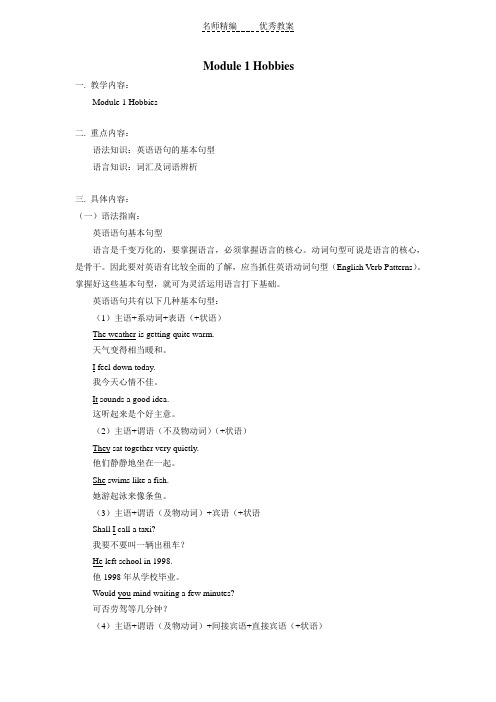
Module 1 Hobbies一. 教学内容:Module 1 Hobbies二. 重点内容:语法知识:英语语句的基本句型语言知识:词汇及词语辨析三. 具体内容:(一)语法指南:英语语句基本句型语言是千变万化的,要掌握语言,必须掌握语言的核心。
动词句型可说是语言的核心,是骨干。
因此要对英语有比较全面的了解,应当抓住英语动词句型(English Verb Patterns)。
掌握好这些基本句型,就可为灵活运用语言打下基础。
英语语句共有以下几种基本句型:(1)主语+系动词+表语(+状语)The weather is getting quite warm.天气变得相当暖和。
I feel down today.我今天心情不佳。
It sounds a good idea.这听起来是个好主意。
(2)主语+谓语(不及物动词)(+状语)They sat together very quietly.他们静静地坐在一起。
She swims like a fish.她游起泳来像条鱼。
(3)主语+谓语(及物动词)+宾语(+状语Shall I call a taxi?我要不要叫一辆出租车?He left school in 1998.他1998年从学校毕业。
Would you mind waiting a few minutes?可否劳驾等几分钟?(4)主语+谓语(及物动词)+间接宾语+直接宾语(+状语)He ha nded me the letter(the letter to me).他把信递给了我。
I’ll make you some fresh tea.我去给你沏点新茶。
She kissed her mother goodbye.(5)主语+谓语+宾语+宾语补足语(+状语)Sit down and make yourself comfortable.坐下来,不要拘束。
They called their daughter Mary.他们给女儿取名叫玛丽。
八年级英语下册 Module 1 Hobbies Unit 3 Language in use同步练习 外研版

Module 1 HobbiesUnit 3 Language in useⅠ. 用所给词的适当形式填空。
1. My sister ___________ (not speak) Japanese, but I do.2. I __________ (work) here for twenty years.3. The fish __________ (smell) fresh. Do you want to have some?4. It ________ (be) windy tomorrow. Please wear your warm clothes.5. They ________ (play) on the playground at that moment.6. He ________ (smoke) 100 cigarettes (烟) a wee k one year ago.7. They ________ (come) to see me every day last week.8. What’s Mum __________ (do) righ t now, Tony?Ⅱ. 写出画线部分在句中的成分。
e.g. I bought a new car for my collection.主语谓语动词宾语状语1. Tony has interviewed 20 people for the job. ______2. I’ve got an interview with the manager. ______3. This painting belongs to Mr Wang. ______4. Betty was painting at eight last evening. ______5. There are many books in her desk. ______6. Her desk is bigger than his. ______Ⅲ. 写出下列句子的基本结构,然后根据该结构仿写句子。
外研版初中英语八年级下册教案:Module1 Hobbies

Module1 Hobbies一、教学内容:Unit1 She said China was a very exciting place二、课型:Listening and speaking三、教学目标:1、掌握下列重点词汇:among, awake, sleepy, too, worried。
2、理解直接引语和间接引语,能够将直接引语为一般现在时的陈述句转述为间接引语。
3、能听懂有关娱乐话题的广播节目,获取对话中的主要信息和细节。
4、能够转述他人的话语(一般现在时的陈述句)。
5、能通过对话,让同学们感受朋友、同学间互相关心、爱护的情感。
四、教学重难点:1、理解直接引语和间接引语,并能将直接引语为一般现在时的陈述句转述为间接引语五、教学准备:PPT、课件、录音机六、教学过程:A. 单项选择.( )1. Last night I stayed ________ until midnight because I ate too much.A. wokeB. awakeC. wakingD. woken( )2. The old man sat ______ the children. He told his life story to the children around him.A. betweenB. behindC. besideD. among( )3. He went to bed, and fell fast ______.A. sleepyB. asleepC. sleepD. sleeping( )4. We ______ when the beautiful music ended.A. cried and shoutedB. enjoyed and likedC. smiled and laughedD. clapped and cheered( )5. Do you know ______ make him angry last time?A. whenB. thatC. whatD. ifB. 单词拼写.1.I couldn’t stay _____________(醒着的) because it was very late.2.The maths problem is ________________(太)difficult for me to work out.3.He seemed _________________(焦虑的)about the situation.4.Relax! Don’t forget you are ________________(在…之中)friends.5.Don’t stay up late if you feel _______________(困的).C. 把直接引语转换为间接引语.1.She said to him, “Your pronunciation is better than mine.”________________________________________________________________2.He said, “I need some ink.”________________________________________________________________达标训练题一、选择填空( ) 1. — How are you feeling after the long walk?— I am _________ tired.A. a kindB. a kind ofC. a bit ofD. a bit( ) 2. The boss of the factory made the workers __________ twelve hours a day.A. workingB. workC. to workD. worked( ) 3. — When did he begin to collect stamps?— __________ of 2005.A. In summerB. On summerC. In the summerD. On the summer( ) 4. —What’s your hobby, Jack?— I like playing football ______ listening to music.A. as well asB. as good asC. such asD. as a result( ) 5. — What did the teacher say?— He asked us _________ in class.A. don’t talkB. not to talkC. to not talkD. not talking( ) 6. Please move this table away. It _______ too much room.A. takes upB. tidies upC. takes offD. takes away( ) 7. —Is there _______ in today’s newspaper?—Yes, China has received many new pictures taken by Chang’e I.A. everything importantB. important somethingC. anything importantD. important anything( ) 8. — What are you up to?— There _____ a lot of work _____ today.A. is; doingB. are; doingC. are; to doD. is; to do( ) 9. Most young people are ________ playing computer games.A. popular withB. interested inC. interesting inD. popular in()10.Which hobby do you think _____ good for your study?A. itB. isC. it’sD. its二、用括号内所给单词的适当形式填空。
外研版英语八下module 1unit 3 language in useword教
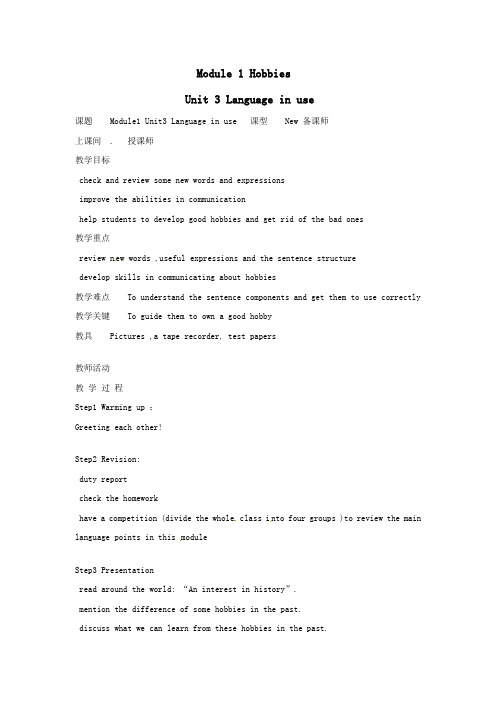
Module 1 HobbiesUnit 3 Language in use课题Module1 Unit3 Language in use 课型New 备课师上课间. 授课师教学目标check and review some new words and expressionsimprove the abilities in communicationhelp students to develop good hobbies and get rid of the bad ones教学重点review n ew words ,useful expressions and the sentence structuredevelop skills in communicating about hobbies教学难点To understand the sentence components and get them to use correctly 教学关键To guide them to own a good hobby教具Pictures ,a tape recorder, test papers教师活动教学过程Step1 Warming up :Greeting each other!Step2 Revision:duty reportcheck the homeworkhave a competition (divide the whole class i nto four groups )to review the main language points in this moduleStep3 Presentationread around the world: “An interest in history”.mention the difference of some hobbies in the past.discuss what we can learn from these hobbies in the past.listen to the passage in activity 7read the five questions of Activity 7. Predict the answer.b. To listen to the tape and choose the right answ ers.c. To listen again and then check by themselvesd. To ch e ck the answers all togetherStep4 Practice1. Classify the sentencesa. You are happy now.b. He laughed at the party.c. I like reading all the time.d. His hobby has brought him enjoyment .e. We can help you develop new skills.f. There are many books in the library.Step5 SummaryGrammar in this module学生活动To get the students on duty to finish the partTo get the students to remember the main points in this unit .the group to get the most points are the winners(closing books )To do them by themselvesTo finish the part by themselvesTo discuss in groupsTo remember them by heart课堂练习一.单词拼写’s very important to d____ our s tudy skills.you like to i______ the great man?b______ a successful young writer in 2003.板书设计Module1 Unit3 Language in usestructu resfamous prover bs: a. No pains, no gains! 不劳无获。
八年级英语下册 Module 1 Hobbies重难点讲解 外研版

Modue 1 Hobbie一教学内容:Modue 1 Hobbie二重点内容:语法知识:英语语句的基本句型语言知识:词汇及词语辨析三具体内容:(一)语法指南:英语语句基本句型语言是千变万化的,要掌握语言,必须掌握语言的核心。
动词句型可说是语言的核心,是骨干。
因此要对英语有比较全面的了解,应当抓住英语动词句型(Engih Verb 天气变得相当暖和。
I fee down toda我今天心情不佳。
It ound a good idea这听起来是个好主意。
(2)主语谓语(不及物动词)(状语)The at together ver quiet他们静静地坐在一起。
She wim ie a fih她游起泳来像条鱼。
(3)主语谓语(及物动词)宾语(状语)Sha I ca a tai我要不要叫一辆出租车He eft choo in 1998他1998年从学校毕业。
Woud ou mind waiting a few minute可否劳驾等几分钟(4)主语谓语(及物动词)间接宾语直接宾语(状语)He handed me the etter(the etter to me)他把信递给了我。
I’ mae ou ome freh tea我去给你沏点新茶。
She ied her mother goodbe(5)主语谓语宾语宾语补足语(状语)Sit down and mae ouref comfortabe坐下来,不要拘束。
The caed their daughter Mar他们给女儿取名叫玛丽。
(6)there be 主语状语There are man tor boo in hi choobag她的书包里有好多故事书。
There i a ver nice cue from Latin, uch a French, Itaian, and Se citie, ie/ uch a Dalian and Kunming are ver cean and beautifu有些城市,例如大连、昆明,非常干净、美丽。
八年级英语下module 1 hobbies复习要点(外研社八年级下)

Module 1 Hobbies复习要点一、词汇见书后附录二、重点词组tidy up 收拾take up 占用(时间或空间)a bit +adj. / a bit of +n. 一点儿… (区别于a little +adj. / n. )a collection of stamps / collect stamps 集邮play the violin / the piano / the drum / the flute 拉小提琴/弹钢琴/打鼓/吹笛子play football / tennis / volleyball 踢足球/打网球/打排球listen to music 听音乐all the time 一直, 总是be / show/ become interested in sth. 对…感兴趣/显示出/变得感兴趣next time 下一次at the end of … 在…末尾need to do sth. 需要做某事start doing sth./ to do sth. 开始做某事how often 多久一次(询问频率)grow vegetables 种菜look after… 照顾, 照看such as…= for example 例如grow as a person 成长develop one’s interests 发展兴趣come out 出版; 出现; 结果是as a result 结果like doing sth. / to do sth. 喜欢做某事in the future 在将来try to do sth. / try doing sth. 尽力做某事/尝试做某事in one’s free/ spare ti me 在某人业余时间bring sb. great success 给某人带来成功{ 注意词性success n. successful adj.successfully adv. succeed (in doing sth.) v. }be popular with … 在…中受欢迎write to sb. 给某人写信all over the world 遍及全世界think about… 考虑某事find out ( about )… 查明有关某事dress in… 穿着…衣服in the past 在过去not only…but also… 不仅…而且…三、重点知识点✧make +sb. / sth. +adj. 使…怎么样e.g. The news made her happy / sad / excited.His words made the teacher angry.✧使役动词make / let / have sb. do sth. 使某人做某事e.g. Hobbies can make you grow as a person.The joke made us laugh.The bad news made her cry.Let’s go home.✧感官动词hear / listen to / see / watch / feel sb. do / doing sth.(其中do强调动作的全过程,而doing强调动作正在发生。
外研版英语八下module 1unit 3 language in useword讲
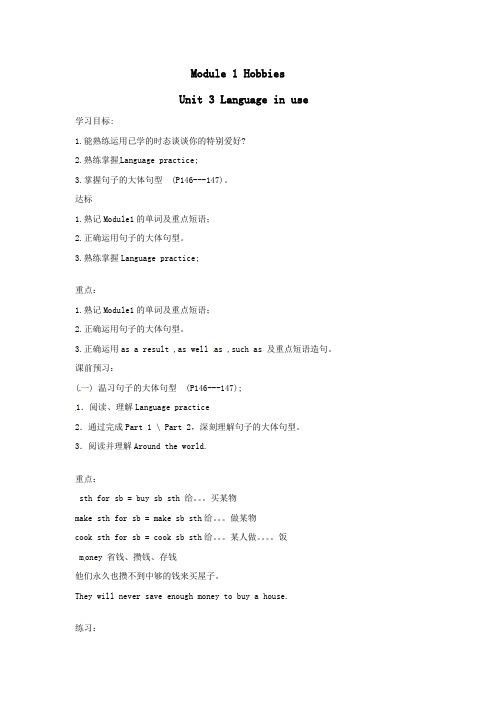
Module 1 HobbiesUnit 3 Language in use学习目标:1.能熟练运用已学的时态谈谈你的特别爱好?2.熟练掌握Language practice;3.掌握句子的大体句型 (P146---147)。
达标1.熟记Module1的单词及重点短语;2.正确运用句子的大体句型。
3.熟练掌握Language practice;重点:1.熟记Module1的单词及重点短语;2.正确运用句子的大体句型。
3.正确运用as a result ,as well as ,such as 及重点短语造句。
课前预习:(一) 温习句子的大体句型 (P146---147);1.阅读、理解Language practice2.通过完成Part 1 \ Part 2,深刻理解句子的大体句型。
3.阅读并理解Around the world.重点:sth for sb = buy sb sth 给。
买某物make sth for sb = make sb sth给。
做某物cook sth for sb = cook sb sth给。
某人做。
饭m oney 省钱、攒钱、存钱他们永久也攒不到中够的钱来买屋子。
They will never save enough money to buy a house.练习:一.选择填空:( ) hobby do yo u like _______ ?A: good B: well C: best( ) one can _______ who stole the bag .A: find B: find out C: look for( ) hobbies are very _______ .A: relax B: relaxed C: relaxing( ) student spent two hours _______ the book.A: reading B: read C: to read( ) like playing ______ piano ,but my sister likes playing _____ table tennis . A: the ,the B: \, \ C: the, \二.单词拼写:1. She ________ (想象) that she will m ake good marks .2. His father got a good _________ (结果) in the factory .3. The man brought his son _________ (成功) and enjoyment .4. __________ (青少年) should often have sports三.完成句子:1. 这本书在2003年1月25日出版。
吉林省伊通县实验中学八年级英语下册《Module 1 Hobbies》period 3课件 外研版
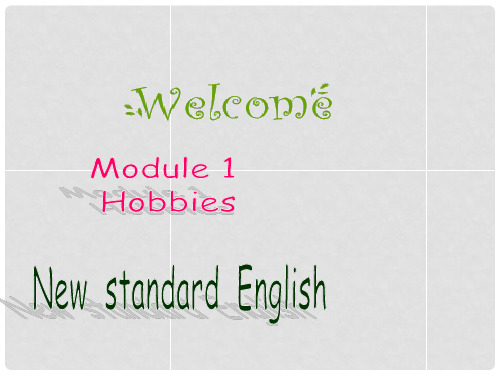
Have you found out Nhomakorabeayour partner’s hobby now? Make notes and write a short passage about “My classmate’s hobby.” Use “as well as”, “such as“ or “as a result”.
Period 3
Are high school students too young to write?
yes
vs
no
Can you give us some advise about hobbies?
1.Choose creative hobbies such as painting and writing. Because they can give us new skills. 2.Choose some sports. Because they are good for our health. 3.Don’t spend too much time on our hobby. 4.Don’t spend all our free time on our favourite hobby. 5. Try to do something new or different.
1.Which hobby is the most popular with girls? a) Playing chess. b) Singing and dancing. c) Playing football. 2.Which hobby is the most popular with boys? a) Playing football. b) Playing computer games. c) Watching films. 3.Which hobby do boys and girls both enjoy? a) Playing chess. b) Collecting things. c) Playing table tennis. 4.Which hobby helps develop new skills? a) Growing vegetables. b) Playing chess. c) Collecting stamps. 5.Which hobby helps other people? a) Growing vegetables. b) Collecting stamps. c) Playing chess.
外研版八年级英语下册M1 Unit 3优质课件

Put the words and phrases in the correct order to make sentences.
1. I / for her birthday / bought/ a new book / my mother / . I bought my mother a new book for her birthday.
2. Choose some sports. Because they are good for our health.
3. Don’t spend too much time on our hobby. 4. Don’t spend all our free time on our favourite
WY八年级版下学期
Module 1 Hobbies Unit 3 Language in use
Focus : Part of speech and sentence components Drilling: Activity 1 and 2 Key points: P 6 in life, make sb. sth., save money Suggestion: It’s necessary to spend some time help the students learn part of speech and sentence components.
3. Jane is good at singing _a_s_w__e_ll_a_s_ dancing. 4. At our school you can try lots of new activities, __s_u_ch__a_s _, creative writing and playing the piano.
广东省佛山市八级英语下册《Module 1 Hobbies Unit 3 Language in use》课件
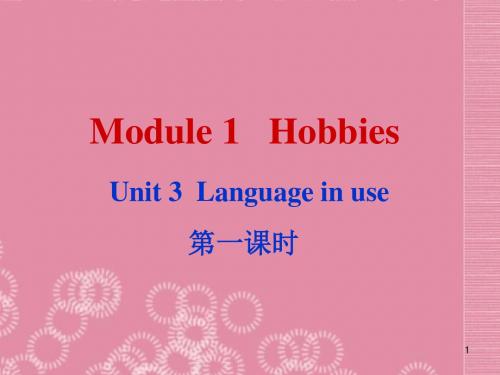
6. is / one / pair / table / of / glasses / on / the / there
/. _______________________________________ There is one pair of glasses on the table.
11
4. are / lots / flowers / of / in/ the / garden / there /.
_______________________________________ There are lots of flowers in the garden. 5. will / arrive / at / we / the / this / airport / afternoon /.
Module 1 Hobbies
Unit 3 Language in use 第一课时
1
1、词汇训练:复习M1单词;
2、听力训练:课内听力练耳 3、语用练习:朗读课文; 4、达标测试。
2
Translate the phrases
1) 将来___________________ in the future 2) 结果___________________ as a mountain biking 4)出版_______________ come out
9
3. a) When my mother has too much housework, I
often help her.
外研版英语八下《module1hobbies》word重难点讲解
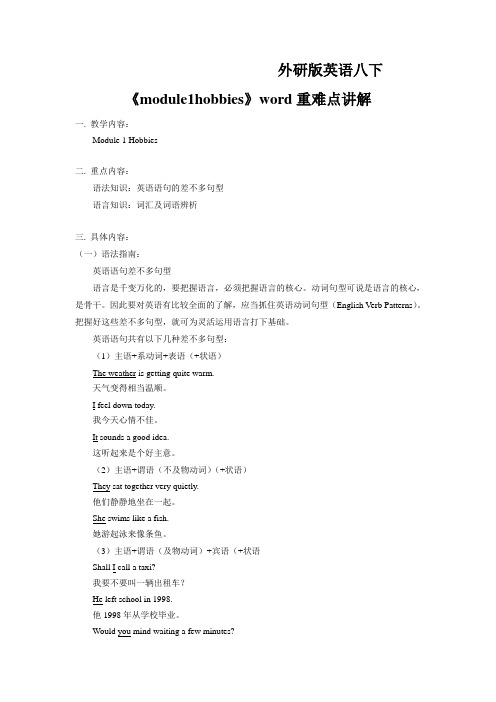
外研版英语八下《module1hobbies》word重难点讲解一. 教学内容:Module 1 Hobbies二. 重点内容:语法知识:英语语句的差不多句型语言知识:词汇及词语辨析三. 具体内容:(一)语法指南:英语语句差不多句型语言是千变万化的,要把握语言,必须把握语言的核心。
动词句型可说是语言的核心,是骨干。
因此要对英语有比较全面的了解,应当抓住英语动词句型(English Verb Patterns)。
把握好这些差不多句型,就可为灵活运用语言打下基础。
英语语句共有以下几种差不多句型:(1)主语+系动词+表语(+状语)The weather is getting quite warm.天气变得相当温顺。
I feel down today.我今天心情不佳。
It sounds a good idea.这听起来是个好主意。
(2)主语+谓语(不及物动词)(+状语)They sat together very quietly.他们静静地坐在一起。
She swims like a fish.她游起泳来像条鱼。
(3)主语+谓语(及物动词)+宾语(+状语Shall I call a taxi?我要不要叫一辆出租车?He left school in 1998.他1998年从学校毕业。
Would you mind waiting a few minutes?可否劳驾等几分钟?(4)主语+谓语(及物动词)+间接宾语+直截了当宾语(+状语)He ha nded me the letter(the letter to me).他把信递给了我。
I’ll make you some fresh tea.我去给你沏点新茶。
She kissed her mother goodbye.(5)主语+谓语+宾语+宾语补足语(+状语)Sit down and make yourself comfortable.坐下来,不要拘谨。
外研版八年级下册英语教案:Module1 Hobbies
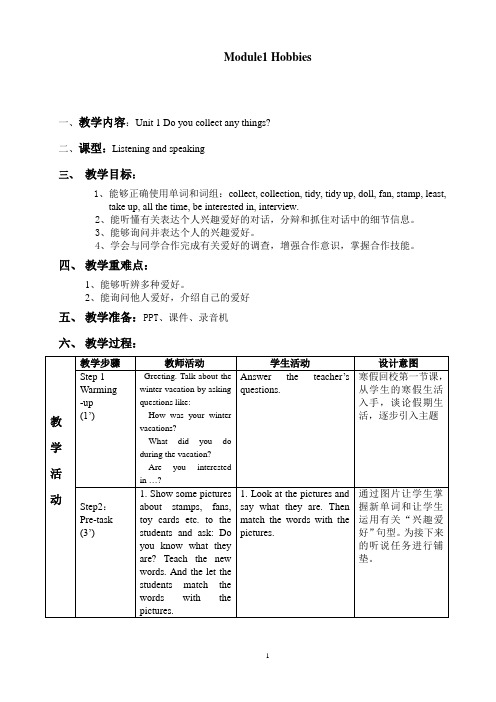
Module1 Hobbies一、教学内容:Unit 1 Do you collect any things?二、课型:Listening and speaking三、教学目标:1、能够正确使用单词和词组:collect, collection, tidy, tidy up, doll, fan, stamp, least,take up, all the time, be interested in, interview.2、能听懂有关表达个人兴趣爱好的对话,分辩和抓住对话中的细节信息。
3、能够询问并表达个人的兴趣爱好。
4、学会与同学合作完成有关爱好的调查,增强合作意识,掌握合作技能。
四、教学重难点:1、能够听辨多种爱好。
2、能询问他人爱好,介绍自己的爱好五、教学准备:PPT、课件、录音机六、教学过程:1. Fill in the passageToday Sally and Daming come to visit Lingling. When they enter Lingling’s room ,they see her room is 1)_____. Lingling feels sorry and she 2)_____ it up at once. Sally is surprised to 3)_____there are lots of 4)_____ in the room. And they are beautiful. Then they begin to talk 5)_____. Sally says that she has a 6)_______ of 7)____ andher brother 8)______ stamps. Daming has a collection, too. It is a collection of 9)_____. Then Sally tells them that her 10)____ hobby is music. She tells them that next Friday she is going to Radio Beijing to give an 11)______. Do you think she’ll be famous? 2.Make a survey e. g. A: What's your hobby, Tom ? B: It's collecting erasers .A: When did you start doing it? B: In 2002.A: Why do you enjoy your hobby?B: Because it's funny .Now make a report about your survey.-----------------------------------------------------------------------------------------------------------------------------------------------------------------------------------------------------------------------------------------------------------------------------------------------------------------------------------------------------------------------------------------------------------------------------------------------------------------------------------------------------------------------------------------------------------------达标训练题一、选择填空( ) 1. — How are you feeling after the long walk?— I am _________ tired.A. a kindB. a kind ofC. a bit ofD. a bit( ) 2. The boss of the factory made the workers __________ twelve hours a day.A. workingB. workC. to workD. worked( ) 3. — When did he begin to collect stamps?— __________ of 2005.A. In summerB. On summerC. In the summerD. On the summer( ) 4. —What’s your hobby, Jack?— I like playing football ______ listening to music.A. as well asB. as good asC. such asD. as a result ( ) 5. — What did the teacher say?— He asked us _________ in class.A. don’t talkB. not to talkC. to not talkD. not talking( ) 6. Please move this table away. It _______ too much room.A. takes upB. tidies upC. takes offD. takes away( ) 7. —Is there _______ in today’s newspaper?—Yes, China has received many new pictures taken by Chang’e I.A. everything importantB. important somethingC. anything importantD. important anything( ) 8. — What are you up to?— There _____ a lot of work _____ today.A. is; doingB. are; doingC. are; to doD. is; to do( ) 9. Most young people are ________ playing computer games.A. popular withB. interested inC. interesting inD. popular in()10.Which hobby do you think _____ good for your study?A. itB. isC. it’sD. its二、用括号内所给单词的适当形式填空。
外研版英语八下Module1HobbiesUnit3word同步练习

Module 1 HobbiesUnit 3 Language in use一、根据汉语提示完成下列句子1. How did you become i _______ in playing the piano.2. When he was at teenager, he started p_______ the piano as a hobby.3. He decided to be a guitarist in a b________.4. I often heard her play the v________.5. My mother bought me a doll for my c________.6. There is a c________ hall at Radio Beijing.7. My father is a m________.8. We made a d________ cake this morning. Now we need to clear up the kitchen.9. The teacher didn’t teach me how to play the g_________.10. At our school we can try lots of new activities s________ as sailing crea tive writing andplaying musical instrument二、选择填空( ) 1. Shall we spend some time _____ table tennis on Saturday?A. practiceB. practiceC. practicingD. practiced( ) 2. I’d like to learn another language ______ I want to travel around the world one day.A. as a resultB. as well asC. becauseD. because of( ) 3. —______ glassed?—Yes, I saw them on your bed a minute ago.A. Do you seeB. Had you seenC. Would you seeD. Have you seen ( ) 4. He was ______ excited ______ he couldn’t say a word.A. so ; thatB. such ; thatC. too ; toD. enough ; to( ) 5. The children look very ______ today. They are playing ______ in the park.A. happy ; happyB. happily ; happilyC. happy ; happilyD. happily ; happy ( ) 6. It’s better ______ the book to the library as soon as you finish it.A. returnB. to returnC. retu rningD. returned( ) 7. You may watch TV this evening. But you ______ finish your homework firstA. canB. mustC. needD. may( ) 8. I watch him ______ basketballA. playingB. to playC. playedD. play三、完型填空John is a famous writer now. But he said he was not a (1) ______ student when he was young. He was often late for (2) _____ and didn't like doing his homework. Sometimes, he slept in class while the teacher was teaching. He didn't understand much, (3) ______ he always thought he understood everything. One day the teacher (4) _____ the students a question, “When Jack was ten years old, (5) _______ brother Bob was twenty, Jack is fifteen now and (6) ______ is his brother Bob?” John said, “That's easy.Bob is twice as old as Jack, so he is now thirty.”Another time, the (7)______ in a science class asked, “When it thunders(打雷), (8)______ do we always see the light before we (9)______ the sound?”“But, Miss,” said John quickly, “don't you (10) ______our eyes are in front of our ears?”( ) 1. A. good B. tall C. rich D. fat( ) 2. A. sleep B. lunch C. class D. play( ) 3. A. so B. and C. or D. but( ) 4. A. sent B. asked C. told D. found( ) 5. A. your B. my C. his D. her( ) 6. A. how many B. how old C. what D. who( ) 7. A. teacher B. farmer C. nurse D. policeman( ) 8. A. what B. when C. where D. why( ) 9. A. break B. make C. hear D. smell( ) . read B. hope C. study D. know四、阅读理解Many children like collecting stamps. Stamps collecting didn’t begin until 1854. As time goes on,there are more and more kinds of stamps. These stamps are very beautiful and interesting. There are many wonderful pictures on them. And there are more stamp collections. Not only children but also men and women collect stamps. In 1921, American began selling all kinds of stamps to be collectors. In some countries, there are even lessons on stamp-collecting in school. People all over the world are becoming more and more interested in stamps. Each pictureon a stamp has its meaning in it. It may be the face of a great leader, a famous scientist or a writer. It may be a beautiful bird or fish. It may be an interesting place. Every stamp tells us a story.根据短文内容判断正误。
八年级英语下册Module1HobbiesUnit3Languageinuse教案
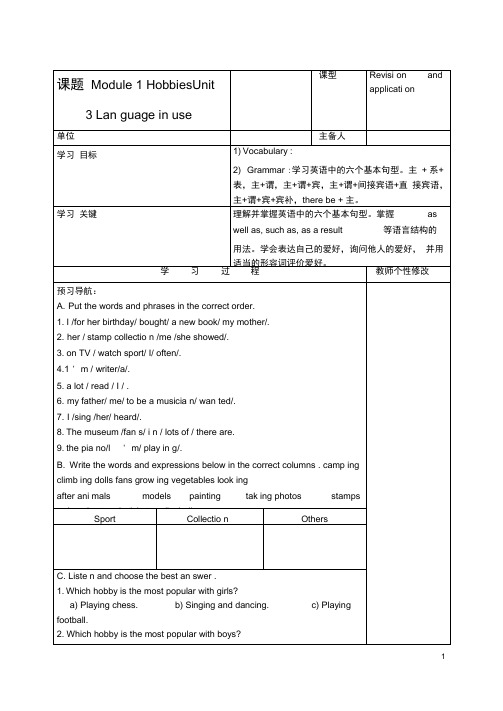
a) Play ing football. b) Play ing computer games. c) Watch ing films. 3. Which hobby do boys and girls both enjoy?a) Playing chess. b) Collecting things.c) Playing table tennis.4. Which hobby helps develop new skills?a) Grow ing vegetables. b) Play ing chess. c) Collect ing stamps.5. Which hobby helps other people?a) Growing vegetables. b) Collecting stamps. c) Playing chess.精彩课堂:Step1.知识拓展1. They dress in the clothes people wrote in the past .....他们穿人们过去穿的衣服……dress后接表示人的名词或代词,意为“给……穿衣服”。
表示“自己穿衣服时要用dress oneself..dress 的过去分词是dressed ,常构成短语get dressed (表动作),be dressed (表状态)。
表示穿何种衣服时,后常加介词in.女口:The boy is too young to dress himself.She could not wash herself or get dressed.My sister is dressed in red today.2. 六种基本句型结构【句型一】主语+谓语(不及物动词)+ (状语[副词、名词、介词短语等])The childre n are liste ning quietly. 孩子们在静静地听着。
【句型二】主语+谓语(及物动词)+宾语(+状语)She ofte n helps him. 她经常帮助他。
- 1、下载文档前请自行甄别文档内容的完整性,平台不提供额外的编辑、内容补充、找答案等附加服务。
- 2、"仅部分预览"的文档,不可在线预览部分如存在完整性等问题,可反馈申请退款(可完整预览的文档不适用该条件!)。
- 3、如文档侵犯您的权益,请联系客服反馈,我们会尽快为您处理(人工客服工作时间:9:00-18:30)。
should be polite.”
b) Parents often ask __________________ children to be polite.
6. My father wanted me to be a
musician.
7. I heard her sing.
8. There are lots of fans in the
museum.
9. I’m playing the piano.
Activity 2
1. We can do many interesting things in life. 2. John gave his father a very old book. 3. He reads in the evening. 4. John likes making things. 5. Last year, he made a bicycle for his brother.
谓语
1. 谓语是说明主语的动作或状态。一般
放在主语之后。
2. 谓语一般是由动词或连系动词+表语
担当。
3. 谓语必须和主语在“人称”和“数”
上保持一致。
We work hard.(动词) Mike likes his new book. His parents are teachers.(连系动词+表 语) She is reading.
主语 1. 主语是一个句子的主题,也是句子的 主体, 表示句子主要说明的人或事物。 2. 它的位置一般在句首。 3. 一般由名词、代词或相当于名词或代 词的词、短语或句子等充当。 The meeting will begin at 9:00.(名词) We study in No. 1 Middle School.(代词) Smoking is bad for you.(动名词)
4)出版 come out ___________________
5)例如 ___________________ such as
6) 试图做某事______________ try to do sth. 7) 整理 ___________________ tidy up 8) 同...一样_________________ as well as 9) 空闲时间 _________________ free time 10) 照顾 look after ____________________
Байду номын сангаас
句子成分
1. 组成句子的成分叫句子成分。 2. 在句子中,词与词之间有一定的组合关系, 按 照不同的关系,可以把句子分为不同的组成 成分。 3. 句子成分由词或词组充当。 4. 英语的基本成分有六种:主语(subject)、谓语 (predicate)、表语(predicative)、宾语(object)、 定语(attribute)和状语(adverbial)。
3) 不定式作状语: The boy needs a pen to do his homework.(目的状 语) 4) 名词作状语: Come this way! (方 向状语)
定语 1. 定语是用来修饰名词; 代词或句子的 成分. 2. 定语有前置定语, 后置定语. 3. 充当定语的词有:形容词;名词;代词; 数词;名词所有格......方位副词;不定 式;动词的-ing形式;过去分词;从句 等.例如:
3. Jane is good at singing ________ as well as dancing. 4. At our school you can try lots of new activities, such as creative writing ______ and playing the piano. 5. We made a delicious cake this tidy up morning. Now we need to _______ the kitchen.
6. I asked my parents to buy me a dog. I would look after it. ________ 7. Shall we spend some time __ ______ in playing table tennis on Saturday? 8. I buy the magazines when they ________each month. come out
6. John’s mother isn’t interested in his hobby. 7. John’s room isn’t clean. 8. She feeds vegetables. 9. Her hobbies can help her save money.
Activity 3 1. I’d like to learn another language, _______ I want to travel around the because world one day. 2. The Harry Potter stories were very popular and as a result more teenagers _________ began to enjoy reading than ever before.
3 Which hobby do boys and girls both enjoy? a) playing chess b) collecting things c) playing table tennis 4 Which hobby helps develop new skills? a) growing vegetables b) climbing c) collecting stamps 5 Which hobby helps other people? a) growing vegetables b) collecting stamps c) playing chess
3. a) When my mother has too much
housework, I often help her.
b) I often help _____________ my mother do housework __________. 4) a) Parents often say: “Children
Unit 3 Language in use
Translate the phrases
1) 将来 in the future ___________________
2) 结果 ___________________ as a result
3)山地自行车运动 _______________ mountain biking
4. 名词/代词宾格 + 动词不定式: The teacher ask the students to close the windows. 5. 名词/代词宾格 + 分词: I saw a cat running across the road.
状语 状语修饰动词、形容词、副词或全句, 说明方式、因果、条件、时间、地点、 让步、方向、程度、目的等。用作状语 的通常是副词。 1)副词 (短语) 作状语: The boy needs a pen very much. (程 ` 度状语) The boy, now, needs a pen.(时间状语)
表语
1. 表语是表述主语的特征、状态或身份
等。
2. 表语位于连系动词之后,二者构成系 表结构,即合成谓语 3. 表语由名词、形容词或相当于名词或 形容词的词、短语或句子等充当。
Her brother is a driver.(名词) Are you ready?(形容词) We were at home last night.(介词 短语) This book is mine, not yours.(代词)
Tapescript
Girl: We have some interesting results from our survey on teenage hobbies. Boy: What’s the most popular hobby? Girl: Well, boys and girls have different hobbies. The girls like singing and dancing, but the boys prefer playing football, and they like watching it, too. Boy: Oh, I see. Is there anything that boys and girls like doing?
2) 介词短语作状语: In the classroom, the boy needs a pen. (地点状语) Before his mother, Tom is always a boy. (条件状语) On Sundays, there is no student in the classroom. (时间状语)
宾语补足语:位于宾语之后对宾语作出 说明的成分。宾语与其补足语有逻辑上 的主谓关系, 它们一起构成复合宾语。 1. 名词/代词宾格 + 名词: The war made him a soldier. 2. 名词/代词宾格 + 形容词: Please keep the room clean. 3. 名词/代词宾格 + 介词短语: I often find him at work.
Activity 7 Listen and choose the best answer.
1 Which hobby is the most popular with girls? a) playing chess b) singing and dancing c) playing football 2 Which hobby is the most popular with boys? a) playing football b) playing computer games c) watching films
